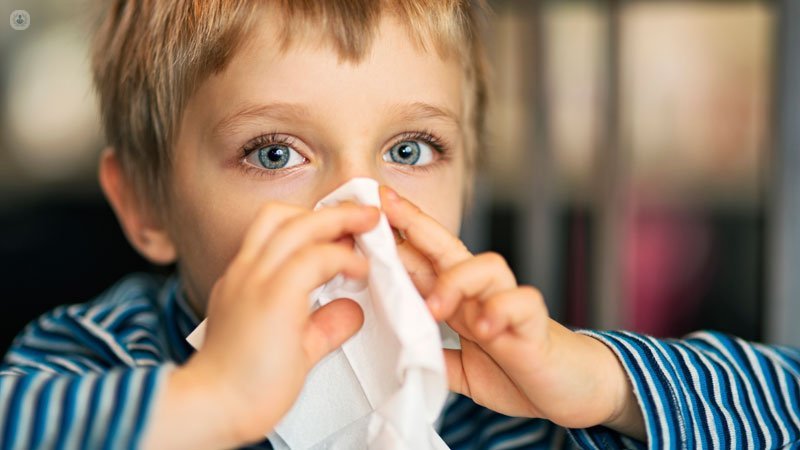Why a child allergy occurs and how to go
Written by:Allergy is a disorder of the immune system in which it responds to harmless substances, causing an allergic reaction. Early diagnosis and timely treatment can prevent possible future complications. It is essential that all adults who take care of the child have evidence of disease and therapeutic measures.

What is allergy
Allergy is a disorder of the immune system. When an agent (bacteria, virus or strange substance -diferente- the body) enters within us a "fight" between the immune system and the invading agent occurs. In the battle the immune system synthesizes specialized substances (antibodies) in the destruction of the agent. This will make, if in the future we are again attacked by the invading agent, it will be quickly destroyed by antibodies.Allergic diseases occur when mistakenly confuses our immune system recognizes as harmful substances that are harmless and makes antibodies (IgE type) against them. To these harmless substances to which our immune system responds by creating antibodies they are called allergens. The main ones are: pollens of some plants, some foods and medicines, some molds, dander and certain microscopic animals that feed on dust mites called.When a person has been sensitized to an allergen, whenever contacts with him a "fight" between the allergen and the antibody is produced, resulting in allergic reactions.
Atopy or hereditary predisposition to allergy
Allergic diseases have much to do with heredity. an allergic disease but is not inherited predisposition to contracting. To this genetic predisposition it is called atopy. Therefore, an atopic child is a child born with a genetic predisposition to allergic diseases. This child can stay for years, even a lifetime without presenting any allergic disease. However, others may present with allergic manifestations since the early days of life.Atopic patients are usually further characterized by presenting a skin and a mucous membrane (skin that lines the organs) overly reactive to nonspecific irritants: pollution, insect bites, viral infections, etc.
Diagnosis of allergic diseases
Not always asthma, rhinitis, atopic dermatitis, urticaria, etc.. they are triggered by an allergic mechanism. It is very important therefore a correct diagnosis in children that suffer. Pediatrician corresponds to direct such a diagnosis and decide when it is appropriate or not an allergy study, which should always be performed by a specialist in Allergology .In order to ensure that a particular disease is caused by an allergic problem the doctor should be able to detect, by various means, the presence in the child of antibodies (IgE) produced by the body in response to contact with the allergen. The antibodies are created in the blood but also bind to special cells of the skin and mucous. Therefore, the fastest and easiest way to detect the antibodies are allergic tests, which consist of applying the allergen on the skin, making a small incision or puncture, and wait a few minutes. If there is an inflammation around the site of inoculation indicates the presence of antibodies and sensitization to this allergen.There are also more sophisticated lab methods that analyze the patient's blood to directly detect antibodies. The mere presence of antibodies allows us to state that the child is sensitized but this does not mean that in all cases, this awareness is responsible for the illness suffered by the child. In case of doubt the allergist uses tolerance tests or provocation, comprising administering, in a controlled manner, the suspected allergen and check that the clinical response obtained corresponds to the patient's disease. These provocative tests can be made for both food allergy and drug allergy or respiratory. They have some risk, so always for the right time allergist evaluate their realization is necessary.
Treatment of allergic diseases
Treatment of allergic diseases is very effective and is supported on four pillars:1) Preventive measures. First you must know the underlying cause of the allergic disease for appropriate preventive measures to be applied: avoid exposure to the allergen can reduce and even eliminate allergic symptoms.2) Drug Therapy. Secondly, adequate drug treatment. There is now a wide range of drugs able to keep under control most of allergic diseases. Any drug can cause adverse effects but, correctly indicated and administered drugs available today we are fortunately very effective and safe.3) Innmunoterapia. Thirdly the inmunoterpia or specific allergy vaccination, only therapeutic measure that has been proven effective in influencing the natural history of the disease. Like any other drug is not without side effects, so you should always be prescribed and controlled by an allergist. It is indicated when not adequately controlled allergic disease, despite measures allergen avoidance and management of safer drugs.4) Education and self. Fourthly education and self-control, based on knowledge of the disease afflicting the child. It must be known by a written report the type of allergy suffers, the adequate preventive measures and proper management indicated: inhalation techniques, circumstances that should be increased or eliminated, as well as the mode of action in case of deterioration.It is very important that the diagnosis of the disease afflicting the child and all therapeutic measures for their control are known not only by the child's parents and pediatrician, but also by teachers and any person at any given time will take care of child care (grandparents, excursions, etc.).
Allergy has different manifestations, the most frequent rhinitis, asthma, urticaria, dermatitis, conjunctivitis, among other. It is extremely important that the cause of the allergy is known to treat it. Allergic diseases, but not all, have a high degree of healing if measures to avoid or reduce exposure to the allergen / s and a specific treatment is still appropriate apply. The vast majority of them can be kept under control. To this must be achieved by the collaboration of all people who have contact with the child: health care workers, family members, teachers and educators, etc.. never forget the patient. It is to be avoided, therefore, self-medication and, in case of doubt, consult your pediatrician and / or allergist.


